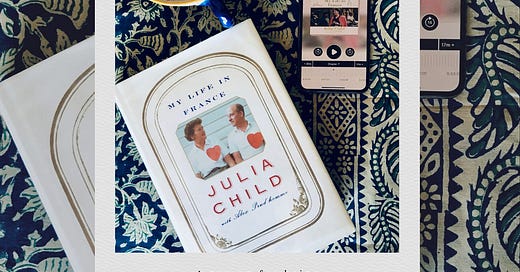My Life In France by Julia Child, written with Child’s great-nephew Alex Prud’homme, is a memoir of the years she lived in France with her husband, Paul. It was while living there that Julia became interested in French cooking. The word interested is inadequate for what was really an intense, voracious love affair with authentic, precise French cooking. She experimented with and perfected techniques, teaching others through her classes and books. It was a love affair that was to sustain her through her life.
The book describes the Childs’ life in Paris, Marseille, Oslo, and in the United States. It describes their amazing meals, the excursions, and trips, the growing circles of friends, and their experience of being part of the United States Foreign Service in the post-WWII cultural and political climate. All these form a brilliant backdrop for Julia’s cooking. She attended the Cordon Bleu school, immersing herself in selecting and shopping for the best ingredients, the most authentic way of preparing dishes, and the wines to pair with them. She teamed up with Simone Beck and Louisette Bertholle to offer cooking classes (L’école des trois gourmandes). Later, the three women collaborated on the manuscript that would eventually become the 726 pages, Mastering The Art Of French Cooking (Vol. 1).
I read My Life In France when the United States was cautiously reopening after the pandemic lockdowns and it felt as though life would never return to normal. At a time of post-pandemic uncertainty, the book provided welcome armchair travel, a visit to Paris and Marseille complete with food, wine, and great company. It’s written in a no-nonsense, forthright manner, but the descriptions of local scenes are vivid, detailed, and almost poetic. Paul and Julia moved to France in 1948, three years after WWII, and life has resumed normalcy: it made me feel hopeful that we, too, would experience a post-pandemic return to normal, or even a renaissance, as some suggested.
I don’t know much about Julia beyond the book, but I admired the way she didn’t wait for everything to be perfect, that she learned as she went along. I admired her dedication even as I realized she wasn’t putting in any extra effort so much as she was that interested in cooking and writing about it. Towards the end of the book, she talks about working on Vol II of Mastering The Art Of French Cooking and how that was a refuge when her husband Paul was ill. I thought again of how art, writing, cooking, and other creative pursuits are both sanctuaries, where we go to hide from the chaos of our world, and showcases, where we express ourselves and are seen.
But the real reason I borrowed this book then was I read in an online article that Julia Child was 49 years old when her book, Mastering The Art Of French Cooking, was published. I was heading into midlife and I, too, was working on a book.1 I saw this book as a sign that I had not arrived too late to write. I saw it as a good luck charm, and I hoped some of the luck would rub off on me. In addition, Julia Child's discovery of her love for cooking (she enrolled at the Cordon Bleu at age 37), followed by her lifelong pursuit of that ( happily ever after), resonated deeply with me because I’d fallen in love with writing, and I wanted to write happily ever after. But I’d only just learned this.
Now, this raised some interesting questions.
Do we need a raison d’etre, a reason for being? Does it stay constant? Can we have more than one? Do we need to make more of an effort to find it early in life? Is it a case of organically following the breadcrumb trails of our interests?
These are obviously the kind of questions each of us would answer differently. And each answer might be the right one. If we are seeking purpose, it is important not to think of its discovery as another destination to arrive at. I will leave you with two quotes, one from Julia Child herself:
“Find something you’re passionate about and keep tremendously interested in it.”
And I think I can borrow Aldous Huxley’s words to steer us away from any heavy striving:
“It’s dark because you are trying too hard. Lightly child, lightly. Learn to do everything lightly. Yes, feel lightly even though you’re feeling deeply. Just lightly let things happen and lightly cope with them. So throw away your baggage and go forward. There are quicksands all about you, sucking at your feet, trying to suck you down into fear and self-pity and despair. That’s why you must walk so lightly. Lightly my darling…“
I’d love to know what you think!
This begs the question: do we read to know ourselves through stories? Is that what a writer does for us?





This was a great read! I really enjoyed your takeaways from Child’s book and I really enjoyed the questions you posed at the end of the piece about our raison d’etres etc.
I believe, we can have more than one raison d’etre, well at least I have more than one... I have always loved skateboarding, it has been my thing for more than 20 years and I loved it so much it inspired me to start writing about it. And now in the last five years I have fallen head over heels for writing as well. And so my two raison d’etres now exist side by side. - thank you
"I thought again of how art, writing, cooking, and other creative pursuits are both sanctuaries, where we go to hide from the chaos of our world, and showcases, where we express ourselves and are seen." - Yes, this! It's also never too late to create. Jon Hamm started acting later in his life. Ke Huy Quan returned to acting after a long hiatus. Sumiko Iwamuro is djing in her late 80s.